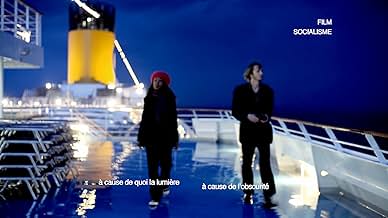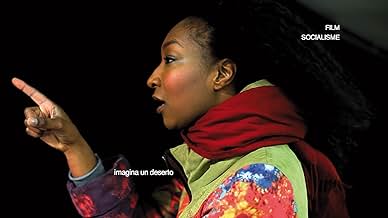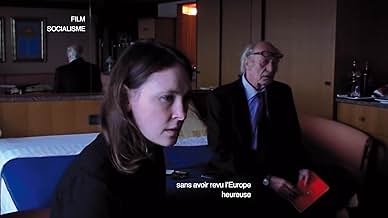VALUTAZIONE IMDb
5,7/10
3014
LA TUA VALUTAZIONE
Aggiungi una trama nella tua linguaThe passengers on a Mediterranean cruise enjoy their luxuries as a small family struggles with overbearing media attention.The passengers on a Mediterranean cruise enjoy their luxuries as a small family struggles with overbearing media attention.The passengers on a Mediterranean cruise enjoy their luxuries as a small family struggles with overbearing media attention.
- Regia
- Sceneggiatura
- Star
- Premi
- 5 vittorie e 2 candidature totali
Agatha Couture
- Alissa (segment "Des choses comme ça")
- (as A. Couture)
Mathias Domahidy
- Mathias (segment "Des choses comme ça")
- (as M. Domahidy)
Quentin Grosset
- Ludovic (segment "Des choses comme ça")
- (as Q. Grosset)
Maurice Sarfati
- (segment "Des choses comme ça")
- (as M. Sarfati)
Nadège Beausson-Diagne
- Constance (segment "Des choses comme ça")
- (as N. Beausson)
Dominique Devals
- (segment "Des choses comme ça")
- (as D. Devals)
Marine Battaggia
- Florine "Flo" Martin (segment "Quo vadis Europa")
- (as M. Battaggia)
Recensioni in evidenza
I get quite excited at the prospect of a new Godard. Not that I see his work as any ultimate example. It's not. But somehow it is in a different milieu to most films you can watch. Like poetry, it's not about the words or images, but the joy that comes from exploring, from original thought. Sound and vision used not to entertain but to seek deeper levels than can be expressed in prose or 'narrative cinema as we know it.' Yet the slew of bad reviews prepared me for the worst. Perhaps age had caught up with the grand master of Nouvelle Vague? Or perhaps Godard was not beyond playing a joke on his audience, just to see what they make of it?
Omens weren't great. A small auditorium and no more than a dozen people there as I walk in. Some obviously by mistake. As they walk out halfway through. But I am already entranced. Wondering if I will be able to see it again in the final screening tomorrow. Looking forward to the DVD so I can stop-start for quotes that send my head spinning like I'm back in my alma mater's philosophy class. A dizzying array of original and masterly techniques. And, like poetry, enough fluidity to offer meanings in ways that suit the individual viewer (persons who walked out excepted).
A warning: there is a 'looking for answers' but no real story. On a difficulty level, this film is much harder than Breathless, Le Mepris, or Vivre Sa Vie. It is warmer and more captivating than Weekend or Made in USA, but only just. Neither does it have the clear expository style of his last most recent well-known movie, Notre Musique. It has three main sections: 1 - scenes on a Mediterranean cruise ship ('Things'), 2 - a European family ('Our Europe'), and 3 - scenes of conflict and war ('Humanities'). Each seeks understanding to certain questions on an individual, interpersonal and political level.
The first section held my attention the most. Inside the cruise ship is a plethora of "things" (if this was Godard of yesteryear, I'd maybe have written 'bourgeois distractions.') Only when we go outside, or see the light shine in, do we experience crisp photography, scenes of genuine beauty, and people spending their time at least trying to solve some of life's deeper puzzles. Perhaps this is just my own interpretation, but I like the way it is depicted visually. Money is a 'common good' – like water – but party-people onboard use it for nothing but bloated consumerism. Meaningless dance classes and revelry. As two people engage in philosophical discourse outside the main hall, a woman repeatedly falls against the glass partition. Is she dancing and letting her spirit free? Apparently not – she falls face down into the swimming pool.
There is a young girl seen frequently with an old man. Something strange there? A hooker perhaps? A maybe rather a scholar or seeker of truth – availing herself of the rich variety of elderly experience onboard (a philosopher, a UN bureaucrat, a Palestinian ambassador, and so on).
Characteristic Godardian effects are used with casual precision. There is no attempt at reality if it stands in the way of the point he is making. Such as when the background noise cuts out momentarily for the word 'happiness' to occurs in the girl's dialogue. Deliberate camera distortions emphasise an alcohol-sodden mentality of the majority of passengers, images often obscenely blurred, as if taken on a mobile phone. Or the mother in Section Two who talks to the camera about how she is totally unaware of the part she is playing.
There are more hidden references than an afternoon of Tarantino movies. Except, unlike Tarantino's work, Godard is not entertaining pub quiz movie geeks; but giving clues to further meanings within his experimental and exploratory work. A young lad gives a young woman a copy of 'La Porte Entroite,' (a coming of age novel). There are nods to Husserl's philosophical geometry which fit the film but will need hours of study to fully appreciate (we see a projection of a man lecturing on 'geometry as origin' – to an empty auditorium). And Balzac's 'Illusions Perdues,' which anticipates themes of aristocracy vs poverty as well as journalism as intellectual prostitution. And don't miss the homage later to Battleship Potemkin's Odessa Staircase slaughter.
Dialogue sparkles from witty – "The United Nations have been somewhat disunited since 1948," to surreal and Zen-like – "Once in 1942 I have encountered nothingness . . ." I'm quoting from memory and leaving the end of the quote for you to enjoy on screen.
The individual's relation to government is addressed by the adolescents in the second Section, posing a difference between the State and Society. The dream of the State is to be 'one'; whereas the dream of the Individual is to be two, to 'pair up.' Aggressively intrusive foreigners demanding driving directions are given a cold shoulder ("Go and invade some other country!") An intrusive camera, making a documentary about a coming election, similarly distances everyone from any (inner) reality.
Some of the phrases from Section Two bleed over into scenes of Section Three bloodshed. The young girl wants people to, "learn to see before learning to read." Godard's intertitles come fast and frequent, and in many different languages. At one point, a prayer in Hebrew and a prayer in Arabic are overlaid, visually and aurally. It recalls Godard's offhand response to the question, "Peace In the Middle East - when?" by replying, "As soon as Israel and Palestine introduce six million dogs and stroll with them as neighbours who don't speak, who don't speak of something else." Cinema is a remarkable opportunity sometimes to communicate without speaking those things which are often too difficult, or too sensitive, or simply whitewashed of their core by aimless chatter. Or by narrative movies.
Omens weren't great. A small auditorium and no more than a dozen people there as I walk in. Some obviously by mistake. As they walk out halfway through. But I am already entranced. Wondering if I will be able to see it again in the final screening tomorrow. Looking forward to the DVD so I can stop-start for quotes that send my head spinning like I'm back in my alma mater's philosophy class. A dizzying array of original and masterly techniques. And, like poetry, enough fluidity to offer meanings in ways that suit the individual viewer (persons who walked out excepted).
A warning: there is a 'looking for answers' but no real story. On a difficulty level, this film is much harder than Breathless, Le Mepris, or Vivre Sa Vie. It is warmer and more captivating than Weekend or Made in USA, but only just. Neither does it have the clear expository style of his last most recent well-known movie, Notre Musique. It has three main sections: 1 - scenes on a Mediterranean cruise ship ('Things'), 2 - a European family ('Our Europe'), and 3 - scenes of conflict and war ('Humanities'). Each seeks understanding to certain questions on an individual, interpersonal and political level.
The first section held my attention the most. Inside the cruise ship is a plethora of "things" (if this was Godard of yesteryear, I'd maybe have written 'bourgeois distractions.') Only when we go outside, or see the light shine in, do we experience crisp photography, scenes of genuine beauty, and people spending their time at least trying to solve some of life's deeper puzzles. Perhaps this is just my own interpretation, but I like the way it is depicted visually. Money is a 'common good' – like water – but party-people onboard use it for nothing but bloated consumerism. Meaningless dance classes and revelry. As two people engage in philosophical discourse outside the main hall, a woman repeatedly falls against the glass partition. Is she dancing and letting her spirit free? Apparently not – she falls face down into the swimming pool.
There is a young girl seen frequently with an old man. Something strange there? A hooker perhaps? A maybe rather a scholar or seeker of truth – availing herself of the rich variety of elderly experience onboard (a philosopher, a UN bureaucrat, a Palestinian ambassador, and so on).
Characteristic Godardian effects are used with casual precision. There is no attempt at reality if it stands in the way of the point he is making. Such as when the background noise cuts out momentarily for the word 'happiness' to occurs in the girl's dialogue. Deliberate camera distortions emphasise an alcohol-sodden mentality of the majority of passengers, images often obscenely blurred, as if taken on a mobile phone. Or the mother in Section Two who talks to the camera about how she is totally unaware of the part she is playing.
There are more hidden references than an afternoon of Tarantino movies. Except, unlike Tarantino's work, Godard is not entertaining pub quiz movie geeks; but giving clues to further meanings within his experimental and exploratory work. A young lad gives a young woman a copy of 'La Porte Entroite,' (a coming of age novel). There are nods to Husserl's philosophical geometry which fit the film but will need hours of study to fully appreciate (we see a projection of a man lecturing on 'geometry as origin' – to an empty auditorium). And Balzac's 'Illusions Perdues,' which anticipates themes of aristocracy vs poverty as well as journalism as intellectual prostitution. And don't miss the homage later to Battleship Potemkin's Odessa Staircase slaughter.
Dialogue sparkles from witty – "The United Nations have been somewhat disunited since 1948," to surreal and Zen-like – "Once in 1942 I have encountered nothingness . . ." I'm quoting from memory and leaving the end of the quote for you to enjoy on screen.
The individual's relation to government is addressed by the adolescents in the second Section, posing a difference between the State and Society. The dream of the State is to be 'one'; whereas the dream of the Individual is to be two, to 'pair up.' Aggressively intrusive foreigners demanding driving directions are given a cold shoulder ("Go and invade some other country!") An intrusive camera, making a documentary about a coming election, similarly distances everyone from any (inner) reality.
Some of the phrases from Section Two bleed over into scenes of Section Three bloodshed. The young girl wants people to, "learn to see before learning to read." Godard's intertitles come fast and frequent, and in many different languages. At one point, a prayer in Hebrew and a prayer in Arabic are overlaid, visually and aurally. It recalls Godard's offhand response to the question, "Peace In the Middle East - when?" by replying, "As soon as Israel and Palestine introduce six million dogs and stroll with them as neighbours who don't speak, who don't speak of something else." Cinema is a remarkable opportunity sometimes to communicate without speaking those things which are often too difficult, or too sensitive, or simply whitewashed of their core by aimless chatter. Or by narrative movies.
We recently screened Godard's contentious "Film Socialisme" at a small art-house cinema in Boulder, CO where I live and I couldn't be more delighted by the response. Namely, there were many people who were infuriated about the film, leaving in droves and upset that such a film both exists and/or would be shown at said theater (the only art-house theater in the city, actually).
One patron was even angry enough to leave a note behind for the concessions stand stating that she "speaks French" and was particularly upset about the subtitles of the film. She'd probably be the kind of person to get upset about the "punctuation problems" in ee cummings' poems. And don't get her started on Andy Kaufman!
First and foremost, "Film Socialisme" is without a doubt a beautiful film. The way in which it was shot and edited is visionary, a true patchwork of modern/post-modern society/cinema today. The kind of film that -- as with the majority of Godard's ouevre -- may be ahead of its time but will certainly be enjoyed by sincere cinephiles looking for something new, bold and fresh. Beyond any sense of provocation, there were true moments of visual/audio splendor that simply cannot be seen anywhere else (by sheer merit of the fact that, yes I agree, no one else would be "allowed" to make/distribute such a film; and that in itself is important when considering whether or not you should spend the money/time on seeing it in the theater).
Clearly, the subtitles of the film -- which are minimalist and fractured (clearly intentionally) - - are a play on one of the film's many themes: the breakdown of communication and language (think Gertrude Stein texting you viz. her thoughts on modern society). That people are growing angry about the challenging and innovative way Godard has aptly chosen to play even now with the very subtitles of his film is extremely exciting. Not to mention the fact that, again, aside from the "gimmick," the subtitles become a poetic innovation unto themselves in which Godard combines words into fascinating portmanteaus that invoke clever wordplay a la some of the greater avant-garde/surrealist literature.
He has finally gone that extra distance in deconstructing every aspect of the film (including, at times, a brilliant dalliance with the audio mix that clearly has confounded viewers a la similar experiments by the likes of the Velvet Underground, Andy Warhol, Andy Kaufman and La Monte Young; there are moments in which you truly wonder whether or not there is an "actual" breakdown of the film being shown -- especially if you're lucky enough to see this film through digital projection; "Is there something wrong with the disc?! Oh no!!" Very exciting. Audience interaction, indeed!)
Ultimately and as per Godard's typical (?) MO, the film is a firm lashing of the perpetuated bourgeois culture (particularly in America; hence his giving us the finger for not knowing French or the many other languages interspersed throughout the polyglot film; "You don't want to learn another language? Fine. Try figuring THIS out!!")
Like Lenny Bruce and a younger John Waters, with "Film Socialisme" Godard is shaking up audience members -- particularly his "greatest fans" -- by provoking them in ways they may not be comfortable with, in ways that may simply repel them. "You want to be shocked? I'll shock you, but be prepared to be, well c'mon: shocked." We don't go to Godard films to watch a clear narrative or to understand everything that happens. It's poetry, it's visual/audio artistry, it's -- ultimately -- play and experimentation. And Godard has once again succeeded in creating something that will not allow us to remain static in our seats. If you can't handle that, he is saying as always, then feel free to leave and don't forget to ask for a refund on your way out.
The megaplex is right down the street. Or, hey, buy a copy of "Breathless" and watch a nice "really weird and wild!!!!" noir film with a plot. It's all up to you!
In the end, the film defies quotation marks. If you want "challenging," you've got plenty of it on Netflix. If you want challenging, however, see "Film Socialisme." Just don't be too upset if it... challenges you.
One patron was even angry enough to leave a note behind for the concessions stand stating that she "speaks French" and was particularly upset about the subtitles of the film. She'd probably be the kind of person to get upset about the "punctuation problems" in ee cummings' poems. And don't get her started on Andy Kaufman!
First and foremost, "Film Socialisme" is without a doubt a beautiful film. The way in which it was shot and edited is visionary, a true patchwork of modern/post-modern society/cinema today. The kind of film that -- as with the majority of Godard's ouevre -- may be ahead of its time but will certainly be enjoyed by sincere cinephiles looking for something new, bold and fresh. Beyond any sense of provocation, there were true moments of visual/audio splendor that simply cannot be seen anywhere else (by sheer merit of the fact that, yes I agree, no one else would be "allowed" to make/distribute such a film; and that in itself is important when considering whether or not you should spend the money/time on seeing it in the theater).
Clearly, the subtitles of the film -- which are minimalist and fractured (clearly intentionally) - - are a play on one of the film's many themes: the breakdown of communication and language (think Gertrude Stein texting you viz. her thoughts on modern society). That people are growing angry about the challenging and innovative way Godard has aptly chosen to play even now with the very subtitles of his film is extremely exciting. Not to mention the fact that, again, aside from the "gimmick," the subtitles become a poetic innovation unto themselves in which Godard combines words into fascinating portmanteaus that invoke clever wordplay a la some of the greater avant-garde/surrealist literature.
He has finally gone that extra distance in deconstructing every aspect of the film (including, at times, a brilliant dalliance with the audio mix that clearly has confounded viewers a la similar experiments by the likes of the Velvet Underground, Andy Warhol, Andy Kaufman and La Monte Young; there are moments in which you truly wonder whether or not there is an "actual" breakdown of the film being shown -- especially if you're lucky enough to see this film through digital projection; "Is there something wrong with the disc?! Oh no!!" Very exciting. Audience interaction, indeed!)
Ultimately and as per Godard's typical (?) MO, the film is a firm lashing of the perpetuated bourgeois culture (particularly in America; hence his giving us the finger for not knowing French or the many other languages interspersed throughout the polyglot film; "You don't want to learn another language? Fine. Try figuring THIS out!!")
Like Lenny Bruce and a younger John Waters, with "Film Socialisme" Godard is shaking up audience members -- particularly his "greatest fans" -- by provoking them in ways they may not be comfortable with, in ways that may simply repel them. "You want to be shocked? I'll shock you, but be prepared to be, well c'mon: shocked." We don't go to Godard films to watch a clear narrative or to understand everything that happens. It's poetry, it's visual/audio artistry, it's -- ultimately -- play and experimentation. And Godard has once again succeeded in creating something that will not allow us to remain static in our seats. If you can't handle that, he is saying as always, then feel free to leave and don't forget to ask for a refund on your way out.
The megaplex is right down the street. Or, hey, buy a copy of "Breathless" and watch a nice "really weird and wild!!!!" noir film with a plot. It's all up to you!
In the end, the film defies quotation marks. If you want "challenging," you've got plenty of it on Netflix. If you want challenging, however, see "Film Socialisme." Just don't be too upset if it... challenges you.
Film socialisme (2010)
BOMB (out of 4)
How does one go about explaining Jean-Luc Godard's FILM SOCIALISME? I guess you could say that the director just throws at us various film clips. Some take place on a ship. Some take place in Egypt. Some just seem to be random shots of people walking around. Some are film in beautiful HD while others are filmed on what appears to be a very old cell phone. The subtitles are often full of mistakes. It could be that the words are put together to where it's hard to read them. It could be that the subtitles aren't really telling us what the characters are saying. Was there a point to this madness? I think there are two possibilities. One is that Godard wanted to drive people to suicide so he made this film. The other theory of mine is that he wanted to make a film so horrid that his followers would still rave about how great it was. Either way this here is a pretty worthless film and it's not that it's horrible because of a horrible filmmaker. No, it's horrible because the filmmaker knows he's making something that is nothing but a waste of time. The reason Godard does this is beyond me but sitting through this film is quite unpleasant and it makes one realize that this film is so bad that you couldn't even recommend it to those who love bad movies. I'm not going to lie and say Godard is one of my favorite filmmakers because he isn't. There have been highly respected films of his (like ALPHAVILLE) that I simply hated. With that said, I could see why some would be drawn to it. With this movie it's just pure garbage and I must admit that I find it funny reading so many reviews that call this a piece of art and one of the greatest films of the decade. Reading Roger Ebert's review states that Godard showed this film in a four-minute version by playing it with the fast-forward button on high. This here might have been the greatest idea the director ever had.
BOMB (out of 4)
How does one go about explaining Jean-Luc Godard's FILM SOCIALISME? I guess you could say that the director just throws at us various film clips. Some take place on a ship. Some take place in Egypt. Some just seem to be random shots of people walking around. Some are film in beautiful HD while others are filmed on what appears to be a very old cell phone. The subtitles are often full of mistakes. It could be that the words are put together to where it's hard to read them. It could be that the subtitles aren't really telling us what the characters are saying. Was there a point to this madness? I think there are two possibilities. One is that Godard wanted to drive people to suicide so he made this film. The other theory of mine is that he wanted to make a film so horrid that his followers would still rave about how great it was. Either way this here is a pretty worthless film and it's not that it's horrible because of a horrible filmmaker. No, it's horrible because the filmmaker knows he's making something that is nothing but a waste of time. The reason Godard does this is beyond me but sitting through this film is quite unpleasant and it makes one realize that this film is so bad that you couldn't even recommend it to those who love bad movies. I'm not going to lie and say Godard is one of my favorite filmmakers because he isn't. There have been highly respected films of his (like ALPHAVILLE) that I simply hated. With that said, I could see why some would be drawn to it. With this movie it's just pure garbage and I must admit that I find it funny reading so many reviews that call this a piece of art and one of the greatest films of the decade. Reading Roger Ebert's review states that Godard showed this film in a four-minute version by playing it with the fast-forward button on high. This here might have been the greatest idea the director ever had.
Far to be a Godard admirer, I was real seduced by this film, a mix of cultural references about Mediteranean area, a good pledge for language as obstacle of understanding, eccentric, innovative, absurd in essence, proposing characters and theirs memories and believes , but not exactly a story.
A film about time and masks and past and facts as pieces of puzzle , it is a provocative invitation to viewer to create his explanations or - and doubts.
For me, the old watch is the main scene defining this film who remains a clash by fragments of doczmentary, stains of kitsch and rediscover of past. All, in essence, in the most honest manner.
A film about time and masks and past and facts as pieces of puzzle , it is a provocative invitation to viewer to create his explanations or - and doubts.
For me, the old watch is the main scene defining this film who remains a clash by fragments of doczmentary, stains of kitsch and rediscover of past. All, in essence, in the most honest manner.
It was eagerly awaited for years,the trailer which was the whole film in fast motion looked ravishing, and it seemed as if in this,perhaps his last film,Godard would deliver his final testament,a summation of all the themes which have run through his work for the last fifty years.From the beginning it looks absolutely stunning.In its high def cinematography the colours are gorgeous,the Mediterranean setting recalling that of Le Mépris ,but whereas the latter film was a profound meditation on European culture and civilisation,here the characters spout banal platitudes about politics or philosophy as the ship sails along past various cities; in the Spanish section there is a scene of a bullfight,in the Italian section a clip from a Rossellini film,it's that predictable.
In the final section the film switches to one of Godard's favourite subjects,the daily routine of a family with young children who run a petrol station and have for no apparent reason a pet llama.Here finally the film shows some kind of rapport with its characters but it is already too late.Yet despite its faults it still exhibits all the hallmarks of Godard's style,the brilliance of his framing and editing,the crucial way sound plays against image,but the feeling persists that perhaps he has no longer anything to say.
In the final section the film switches to one of Godard's favourite subjects,the daily routine of a family with young children who run a petrol station and have for no apparent reason a pet llama.Here finally the film shows some kind of rapport with its characters but it is already too late.Yet despite its faults it still exhibits all the hallmarks of Godard's style,the brilliance of his framing and editing,the crucial way sound plays against image,but the feeling persists that perhaps he has no longer anything to say.
Lo sapevi?
- QuizThe film did not include traditional English language subtitles for releases in countries that spoke such language. Instead, the subtitles were in "Navajo English", a translation that baffled many critics and audience members.
- BlooperSomeone claims that Napoleon founded the Comédie-Française in 1812 in Moscow. Actually, it was founded in 1680 by Louis XIV.
- Citazioni
Rebecca (segment "Des choses comme ça"): [dialogue continuity] You're absolutely right: I don't love any "people." Not French, not North American, not German. Not Jewish people, not black people. I love only my friends... When there are any.
- ConnessioniEdited from La corazzata Potemkin (1925)
- Colonne sonoreMamita mia
Performed by Ernst Busch
I più visti
Accedi per valutare e creare un elenco di titoli salvati per ottenere consigli personalizzati
- How long is Film socialisme?Powered by Alexa
Dettagli
- Data di uscita
- Paesi di origine
- Sito ufficiale
- Lingue
- Celebre anche come
- Film Socialism
- Luoghi delle riprese
- Aziende produttrici
- Vedi altri crediti dell’azienda su IMDbPro
Botteghino
- Lordo Stati Uniti e Canada
- 42.925 USD
- Fine settimana di apertura Stati Uniti e Canada
- 4526 USD
- 5 giu 2011
- Lordo in tutto il mondo
- 222.079 USD
Contribuisci a questa pagina
Suggerisci una modifica o aggiungi i contenuti mancanti

Divario superiore
By what name was Film socialisme (2010) officially released in India in English?
Rispondi











